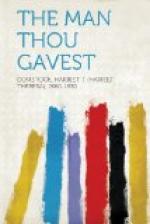“You’re to come to your uncle’s house, Con. It’s rather a shock, but we got you as soon as we could. In the meantime, we’ve followed directions. The will has not been read, of course, but there was a letter found in your uncle’s desk that commanded—that’s the only word to express it, really—Lynda and you and me to come to the old house right after the funeral. We waited to hear from you, Con, but since you could not get here we had to do the best we could. Dr. McPherson took charge.”
“I was buried pretty deep in the woods, Ken, and there was a bad hitch in the delivery of the telegram. Such things do not count down where I was. But I’m glad about the old house—glad you and Lynda are there.”
“Con!”—and at this Brace became serious—“I think we rather overdid our estimate of your uncle. Since his—his going, we’ve seen him, Lyn and I, in a new light. He was quite—well, quite a sentimentalist! But see—here we are!”
“The house looks different already!” Conning said, leaning from the cab window.
“Yes, Lyn’s had a lot to do, but she’s managed to make a home of the place in the short time.”
Lynda Kendall had heard the sound of wheels in the quiet street—had set the door of welcome open herself, and now stood in the panel of light with outstretched hands. Like a revelation Truedale seemed to take in the whole picture at once. Behind the girl lay the warm, bright hall that had always been so empty and drear in his boyhood. It was furnished now. Already it had the look of having been lived in for years. There were flowers in a tall jar on the table and a fire on the broad hearth. And against this background stood the strong, fine form of the young mistress.
“Welcome home, Con!”
Truedale, for a moment, dared not trust his voice. He gripped her hands and felt as if he were emerging from a trance. Then, of a sudden, a deep resentment overpowered him. They could not understand, of course, but every word and tone of appropriation seemed an insult to the reality that he knew existed. He no longer belonged to them, to the life into which they were trying to draw him. To-morrow he would explain; he was eager to do so and end the restraint that sprang into being the moment he touched Lynda’s hands.
Lynda watched the tense face confronting her and believed Conning was suffering pangs of remorse and regret. She was filled with pity and sympathy shone in her eyes. She led him to the library and there familiarity greeted him—the room was unchanged. Lynda had respected everything; it was as it always had been except that the long, low chair was empty.
They talked together softly in the quiet place until dinner—talked of indifferent things, realizing that they must keep on the surface.
“This room and his bedchamber, Con,” Lynda explained, “are the same. For the rest? Well, I hope you will like it.”
Truedale did like it. He gave an exclamation of delight when later they entered the dining room, which had never been furnished in the past; like much of the house it had been a sad tribute to the emptiness and disappointment that had overcome William Truedale’s life. Now it shone with beauty and cheer.




